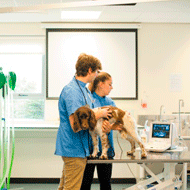Nottingham Vet School comes out top in survey

Veterinary students from Nottingham Veterinary School.
Nottingham Veterinary School is out-performing the UK's six other vet schools, according to the latest survey carried out by the Association of Veterinary Students (AVS).
The survey compares the quality of the degree course, financial support, personal background, widening participation and the role of the AVS.
This year it was carried out in the final term of 2012 and saw responses from 2,106 veterinary students - a 46 per cent response rate.
According to the results, Nottingham Vet School came out on top in every comparison made.
The majority of Nottingham students rated basic clinical skills teaching, the quality of practicals and the balance between lectures and practicals as good or excellent. On these points, Nottingham was significantly ahead of the average scores for vet schools.
For example, 96.2 per cent of Nottingham students rated basic skills teaching on their course as good or excellent, compared to the average score of 65.4 per cent.
The University of Nottingham opened its vet school in 2006. It was the first new vet school to open for 50 years.
AVS president for 2013, Nick Wojciechowski, said: "The University of Nottingham is a newly designed and purpose built veterinary school so clearly has some advantages over longer established institutions.
"However, it outperforms the other vet schools in every single comparison that is made. This ranges from the extra mural studies outside the university and the course structure, content, balance and quality.
"The establishing of a new vet school with such favourable feedback from students should provide other universities with an opportunity to review and learn from what they are offering."



 The Greyhound Board of Great Britain has published new vaccination guidance, with all greyhounds registered from 1 January, 2027 required to have the L4 leptospirosis vaccination, rather than L2.
The Greyhound Board of Great Britain has published new vaccination guidance, with all greyhounds registered from 1 January, 2027 required to have the L4 leptospirosis vaccination, rather than L2.